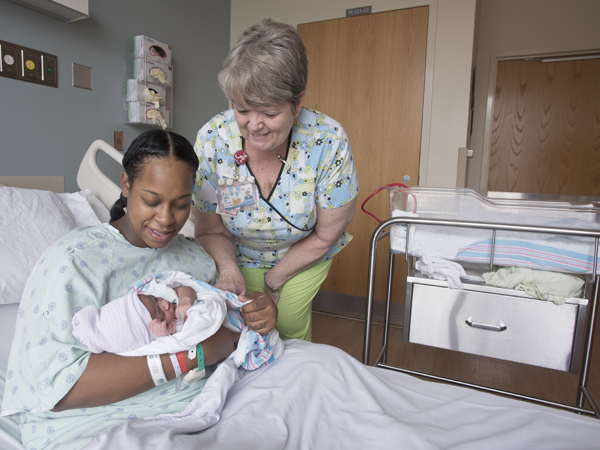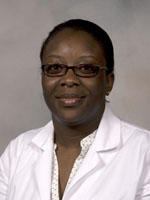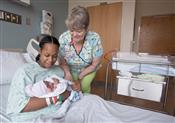Rooming-in option keeps baby by mom’s side

Published in News Stories on August 27, 2015
When Iris Iliana Hartford was born August 19 at the University of Mississippi Medical Center's Wiser Hospital for Women and Infants, she immediately got a roommate: Her mom, Kyera Gilmore Hartford.
Within minutes of Iris' birth, the nurse placed Iris on the bare chest of her mom for skin-to-skin contact, giving Iris comfort and warmth as the two transitioned from labor and delivery to their own room. That skin-to-skin contact allowed Hartford to begin connecting emotionally with her baby.
With the nurse assigned to them just feet away, Iris was weighed and measured. Ointment was placed in her eyes, and she received routine hepatitis B and vitamin K shots, procedures often completed in a hospital newborn nursery.
Healthy moms having healthy babies now have a second option for post-delivery care. Moms can choose to keep their babies in their room, in Wiser's mother-baby unit, during their hospital stay.
Wiser recently began a mother-baby unit in which one nurse is assigned to give total care to a mother and her baby, all in the mother's hospital room. Mothers can also choose for their baby to receive care primarily in the newborn nursery.
Until earlier this year, "we didn't have a comprehensive program to allow babies to stay in their mother's room," said Dr. James Shwayder, professor and chair of the Department of Obstetrics and Gynecology.

Famuyide
But it's become a national trend for mom and baby to have complete care in their own room, and the mother-baby unit is recognized as a best practice in health care, said Dr. Mobolaji Famuyide, associate professor of pediatrics in the Division of Newborn Medicine and a key player in the Wiser mother-baby unit's creation and evolution.
"Rooming in for mom and baby is the best thing for bonding, and for initiating and sustaining breastfeeding," Famuyide said.
It facilitates the interaction that is critical in the first days and weeks of life, said Kim Rickard, a nurse manager in Wiser's mother-baby unit. "Rooming in fosters attachment and mothering instincts when mom's hormones are programmed for it," she said. "Rooming-in newborns cry less and more readily organize their sleep-wake cycles."
The skin-to-skin contact, Rickard said, "helps regulate baby's temperature, blood sugar and breathing. It helps mom with pain control."

Shwayder
The mother-baby unit "allows new mothers to become better educated about clues and little hints about caring for their baby," Shwayder said. That's one reason why Hartford decided before delivery that she wanted to be in a mother-baby unit. When she had her first two children, Hartford said, she kept them with her most of the time.
"It feels more natural," Hartford said. "It gets you more ready for that transition from hospital to home. When you have the baby with you all the time, it gives you a pretty good idea of her behaviors."
Often, a mom doesn't want to be separated from her baby, said Connie Richardson, clinical director for women's services. That's handled by allowing mother and baby to transition together, over about two hours, "instead of the old days when baby was taken from their mom to the newborn nursery for four to eight hours," Richardson said.
On a recent week at Wiser, Shwayder said, 75 percent of moms chose rooming in. "That's terrific," Shwayder said. "We want to be baby friendly and mom friendly."
Rooming in is not for all mothers, especially those who need more recovery time. "This is a culture change," said UMMC nurse manager Slay Jeffords. "People are used to the nursery. This might be unfamiliar to them."
"Our goal is the best interests of the baby, so we are encouraging mom and giving her the education to make an informed choice," Famuyide said.
Newborns who aren't yet ready to go home but don't require intensive care spend time in Wiser's intermediate care nursery. If the baby requires specialized care, UMMC offers the state's only Level IV neonatal intensive care unit, providing around-the-clock treatment including surgical care.
An average 2,400 babies are born each year at UMMC, Richardson said. But for the majority of those births, "we don't have both a healthy mom and a healthy baby. We have a lot of early babies" and others who must get their initial care in the NICU, she said.
When babies room in with their mothers, all of the baby's care, including physical exams, screenings, baths and daily weight check, take place in the mother's room. Mom sleeps when the baby sleeps, and it's "a myth" that mothers get more sleep if the baby is out of the room, Rickard said. Mothers exclusively breastfeed longer and continue to breastfeed longer.
Debbie Lee, the registered nurse assigned to Iris and her mom, was never far away during their stay. "Every four hours, I do an assessment of the baby," she said as she checked Iris. "This is her own little stethoscope."
Although moms who choose formula over breastfeeding are supported by their caregivers at Wiser, breastfeeding "is cost-effective for public health in general," Famuyide said. "Mom is not buying milk. The baby is less likely to be hospitalized during the first year or life or to have respiratory infections, and mom is less likely to have breast or ovarian cancer."
Said Rickard: "The baby who is rooming in with mom is soothed by familiar sounds and the mother has fewer breastfeeding problems. Babies seem more satisfied."
Moms-to-be get information about the mother-baby unit option during their prenatal care or when they're admitted, Famuyide said. And if a mom changes her mind, is exhausted from labor, or needs to temporarily send her baby to the newborn nursery, it's OK.
"We encourage them to have a support system," Famuyide said. "Even though we feel the mother-baby unit is the best practice, this is a choice, and we don't force anyone."
New moms at Wiser receive help in initiating and sustaining breastfeeding - education that's critical in a state with one of the nation's lowest breastfeeding rates. The Centers for Disease Control reports that in 2014, 61.5 percent of the state's new mothers tried breastfeeding, but only 28.8 percent were exclusively breastfeeding when their baby was three months old. That dropped to 10.1 percent at six months.
That compares to a national average of 79.2 percent for new moms who give breastfeeding a try, 40.7 percent exclusively breastfeeding at three months, and 18.8 percent exclusively breastfeeding at six months. "We want to improve breastfeeding rates, because it's the right thing for babies," Shwayder said.
Hartford said she breastfed her first two children, ages 2 and 3, and also is breastfeeding Iris. "I do it for the health benefits, but for bonding, mostly," she said.
Finding the right fit for each new mom and baby is the Wiser staff's goal, Shwayder said.
"We want to meet the needs of every mom who walks through the doors, and to support quality initiatives that have been proven to be good," he said.
Photos
 | 08-24-2015-Greenville Sports Medicine and Rehab Date Listed: 8/24/2015 Listed Facility: Greenville Sports Medicine and Rehab Contact Person: Chris Menhard DPT Address: 1020 Margaret Blvd Greenville, MS Phone: 662-332-4950 Fax: EMail: Website: http://www.greenvil High Resolution Medium Resolution Low Resolution |


